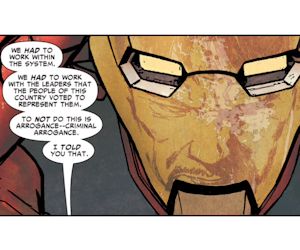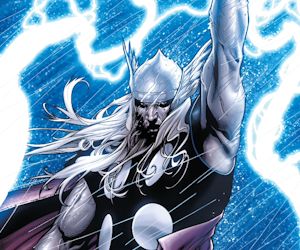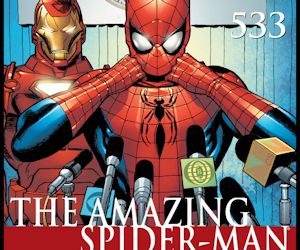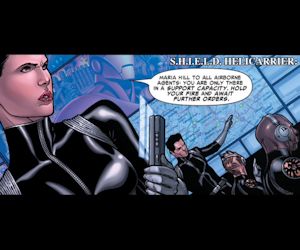7 Problems in Adapting Marvel's Civil War
 | | 2016 is so far away... |
Recently, Marvel shocked fanboys everywhere by giving an orgy of information concerning their future film prospects. One of the biggest surprises was the reveal that the third Captain America film would center on Civil War, a massive event in the comic universe where superheroes go to war with each other over a controversial law that would require them to submit to government authority. Captain America falls on one side of the argument, while Tony Stark (Iron Man) falls on the other. Marvel has even gone as far as confirming that Robert Downey Jr. will reprise his role for the upcoming film, making it clear that they intend to pit these two titans against each other.
While this is incredibly exciting news, it isn't without controversy. I am not stupid enough to question Marvel's plan after they've proved me wrong time and again, but I can't help but wonder how they will adapt the epic Civil War in one film with the cinematic universe they've created thus far. It seems almost impossible, and after rereading much of the Civil War series (I skipped the X-Men stories, since the mutants remain mostly neutral throughout and don't figure into the main plot aside from a few cameos), I have identified seven major problems that Marvel must overcome in order to make this work.
Tony Stark
 | | Defender of government overreach |
While making Iron Man the primary antagonist in the comics is surprising, it isn't nearly as surprising as making the cinematic Iron Man, Robert Downey, Jr., a villain. Events in the upcoming Avengers: Age of Ultron are sure to mark a major shift in Tony Stark's character, but in order for him to take the government's side as he does in the comics, he would have to completely disavow how his character has been developed thus far. He has always been skeptical of authority, and his fears about S.H.I.E.L.D.--as expressed in The Avengers--are realized in Captain America: The Winter Soldier. More importantly, he has taken an extremely anti-government, almost Randian, stance when it comes to his Iron Man armor. Consider his argument before the U.S. Congress in Iron Man 2, in which he proudly proclaims that the government can't have his technology and that he has "privatized world peace." This is not a man ready to submit to government authority and fight his friends over it.
Thor
 | | He's an angry god/alien/clone/cyborg |
One of the biggest twists in the comics arrives in a bolt of lightning. Thor shows up and fights on Tony's side, remorselessly killing one of the rebelling superheroes. This is a surprise because, by this point in the comics, Thor is dead after the events of Ragnarok. As it turns out, Stark has cloned the Asgardian from a strand of hair and programmed him with cyborg technology to do his bidding. This is problematic for the MCU as Thor: Ragnarok is slated to be released after Captain America: Civil War. Unless there's a big surprise leading up to it, Thor should still be alive and well when the cinematic Civil War is declared. The only conceivable way out would be to eliminate Thor entirely from the plot (as I imagine they are going to do), explaining him away as being drawn back to Asgard in anticipation of Ragnarok and unconcerned with the internal conflicts of Midgard (Earth).
Spider-Man and the Fantastic Four
 | | It's Tobey Maguire, isn't it? |
While not having the film rights to the X-Men isn't a problem as they take a huge backseat during the crisis, the lack of both Spider-Man and the Fantastic Four is a huge obstacle. Spider-Man is the heart of the entire war, as he initially takes Tony's side before seeking to redeem himself by joining Captain America. While I understand how this could be made a Captain America story, in the comics, Spider-Man is more of a protagonist. Additionally, Reed Richards of the Fantastic Four is integral in Tony's plan as his most ardent supporter, a man who lends scientific credence to the debate at the expense of ripping apart his superhero family. Johnny Storm is also important, as he is the first real victim of violence, put into a coma when the people begin to rebel against superheroes.
S.H.I.E.L.D.
 | | Maria Hill kind of becomes a beeyatch |
Another key ally that Tony is unlikely to have in the cinematic universe is S.H.I.E.L.D., the government's super-secret police that exists explicitly as a check against superhero power. In the comics, Tony uses S.H.I.E.L.D. (and in the end, becomes the new head) to track down superheroes who refuse to obey the new law, and Captain America finds himself fighting Agent Hill and her squads of "cape-killers" far more than he actually fights Iron Man. In the cinematic universe, though, S.H.I.E.L.D. has been all but dismantled following the events of Captain America: The Winter Soldier, though the ABC television show Agents of S.H.I.E.L.D. explains how Agent Coulson and a small team have continued to operate in the shadows. Having said all that, Marvel has already tipped its hand with the final moments of Winter Soldier, when we see Agent Hill joining Tony Stark's security force, where she is likely to serve a similar role in the film version of the Civil War. Therefore, while a lack of S.H.I.E.L.D. is certainly a problem, it is the most easily dealt with on this list.
-e. magill 11/11/2014
|
|